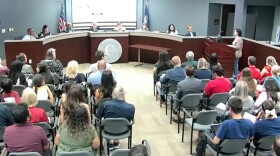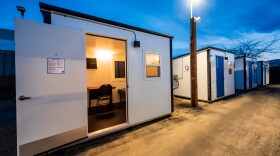Last week, the Denton City Council moved the city’s utilities closer to full automation with a new pilot program using digital water meters — in part to catch leaks sooner — at a time when water utility rates are increasing.
The newer digital meters will offer utility customers more insights into their home’s water usage. They will also “better protect this limited resource,” Stuart Birdseye, a spokesperson for Denton Municipal Electric, told the Denton Record-Chronicle in an email last week.
The pilot program for the advanced metering infrastructure (AMI) has a total contracted amount of about $614,000 and will take six to 12 months for testing and evaluation at various locations throughout the city, Birdseye said.
He said the system’s performance will determine if the city moves forward with full implementation.
Denton currently has about 42,000 water meters in its system. Installing AMI meters for all water customers would cost an estimated $20 million. Birdseye said the costs were programmed into the Water Infrastructure Finance and Innovation Act application for low-interest loans.
“For DME, there have been very few issues with our AMI meters,” Birdseye wrote.
DME paid about $12 million to install digital electric meters for all customers. Birdseye said the project was split into multiple phases between 2010 and 2015.
Denton Water Utilities’ meter selection process evaluated concerns such as privacy and billing accuracy, he said.
“Data integrity, customer privacy and meter accuracy were foundational on selecting the AMI solution,” Birdseye said.
Those few issues included what Birdseye called instances typical with electronic equipment that is exposed to weather and other elements day and night.
Water Utilities management has been planning to upgrade the city’s more than 43,000 water meters since at least 2023.
In late 2023, the city auditor reported that the 10% of water meters that had the incorrect “revisit year” — when a water meter should be replaced — due to a system malfunction would no longer be an issue because management planned to implement an automated metering infrastructure system.
About $7 million had been budgeted to implement the digital meters during fiscal year 2023-24, according to the November 2023 audit follow-up.
In that audit follow-up, Water Utilities management reported they would “target the oldest meters for replacement with the new technology first.”
Stephen Gay, general manager of Denton Water Utilities, said a business case study was done in 2021 with a pilot program that had been planned for 2022 but was never executed.
“Originally, we anticipated this to be a three year roll-out,” Gay said in a Tuesday email. “However, we are accelerating the project based [on] need.”
Denton isn’t the first Texas city to start using digital water meters.
In 2020, Austin started a five-year project to replace 250,000 analog water meters with new digital meters at a $95 million cost, paid with low-interest loans from the Texas Water Development Board, according to a KXAN-TV report in 2023.
Austin Water offers a portal where customers can track their monthly, daily and hourly water consumption and receive alerts when that consumption brings them closer to a higher-tiered utility billing rate.
To secure Denton customers’ data, the National Institute of Standards and Technology (NIST) Smart Grid Cybersecurity Framework offers guidelines that Birdseye said “are generally considered best practice and are voluntarily adopted by the water sector.”
The Environmental Protection Agency and the American Water Works Association both align their guidance and tools with the NIST Cybersecurity Framework. Birdseye said it allows water utilities like Denton’s to use the same risk management practices as the electric sector.
For water utilities, Birdseye said, the main cybersecurity and AMI security drivers come from the EPA and Homeland Security’s Cybersecurity and Infrastructure Security Agency.
Birdseye said these agencies offer extensive “sector-specific cybersecurity tools, self-assessment checklists and incident response guides.” He said they are considered the core security standards for water AMI.
The America’s Water Infrastructure Act also covers AMI and requires community water systems serving more than 3,300 people to conduct risk and resilience assessments. Birdseye said these assessments include an evaluation of electronic, computer or other automated systems.
Birdseye said DME has been using advanced metering infrastructure for more than a decade.
“The City follows strict procedures as required by regulators,” Birdseye said in a Tuesday email to the Record-Chronicle. “Similar procedures will be in place for Water Utilities.”
Earlier last week, the Public Utilities Board recommended approval to the Denton City Council, which unanimously approved the pilot program during the Sept. 30 meeting.
Similar to DME’s AMI meters, Birdseye said, the water AMI meters will transmit water usage data to the system electronically “with little-to-no human interaction.”
“Any variances for low or high reads will still be flagged and reviewed by departmental staff,” Birdseye said.
Currently, a third-party contractor reads Denton water meters. That contract would be terminated once AMI is fully deployed, Birdseye said.
CHRISTIAN McPHATE can be reached at 940-220-4299 and cmcphate@dentonrc.com.
For more than 120 years, the Denton Record-Chronicle has been Denton County’s source for locally produced, fact-based journalism. Your support through a tax-deductible donation or low-cost subscription is vital to our ability to deliver credible, relevant, unique coverage of our community.





